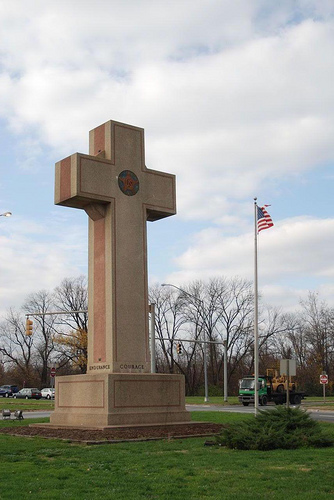For a while now, we’ve been covering the ongoing saga involving the 40-foot-tall World War I “Peace Cross” memorial in Bladensburg, Maryland. It’s clearly a Christian symbol and it’s on public property, maintained by the Maryland National Capital Park and Planning Commission:

In 2012, the American Humanist Association asked the Commission to take down the monument. It was perfectly fine to honor veterans, they said, but not with a symbol that elevates one religion over all others and implies that only Christian soldiers fought in the war.
That complaint led nowhere. So the AHA’s Appignani Humanist Legal Center filed a lawsuit in 2014 on behalf of three plaintiffs:
“To any passerby, a huge cross such as this can only be understood as endorsing Christianity,” said Appignani Humanist Legal Center Legal Director David Niose. “On public property, that violates the Establishment Clause. We can all support memorials to those who have fought for our country, but they cannot take the form of a massive religious symbol on government property.”
It’s not just about the presence of the cross. The taxpayer-funded Commission pays for electricity to keep the cross lit up every night. And even when three other war memorials were installed in the vicinity of the Peace Cross, they were not nearly as large or easily seen.
Unfortunately, a District Judge at the time felt the Cross wasn’t an endorsement of religion, ruling against the AHA:
… The Monument’s secular commemorative purpose is reinforced by the plaque, the American Legion’s seal, and the words “valor,” “endurance,” “courage,” and “devotion” written on it. None of these features contains any religious reference. In short, the record amply demonstrates that the construction and maintenance of the Monument “was not an attempt to set the imprimatur of the state on a particular creed. Rather, those who erected the cross intended simply to honor our Nation’s fallen soldiers.
So a judge said a giant cross was somehow religiously neutral. It made no sense when the ruling came out and it makes no sense now. If a cross isn’t Christian, than what is? Just because you put secular words around it doesn’t change the overall message.
That’s why the AHA filed an appeal in the case earlier this year:
“This imposing Christian cross unfairly endorses Christianity while ignoring the sacrifices and dedication of our non-Christian veterans,” said Roy Speckhardt, executive director of the American Humanist Association. “Government war memorials should honor the service of all veterans, regardless of religion.”
“Every other court decision involving a cross war memorial has found the memorial unconstitutional,” said Monica Miller, senior counsel for the Appignani Humanist Legal Center. “By displaying and maintaining this enormous symbol of Christianity as a monument for veterans, the government is sending a strong message of endorsement and exclusion.”
The appeal itself made several arguments in the AHA’s favor. In short:
- The District Court’s decision goes against what every other federal decision involving a war memorial cross has said.
- The Court was wrong in saying that the giant Christian cross isn’t endorsing Christianity.
- This cross in particular sends a message of “endorsement and exclusion,” in part because of its designation as a “war memorial.”
- The Court was wrong in saying that a reasonable observer would not think this cross was a religious symbol.
- The cross’ history only furthers its religious message.
- The cross creates “excessive entanglement” with religion.
- The Court wrongly applied the reasoning presented by U.S. Supreme Court Justice Stephen Breyer in Van Orden v. Perry (which said a Ten Commandments monument, mixed with secular monuments, on government property was legal).
Any one of these items would make a strong case for why this memorial is promoting Christianity. All together, they leave very little doubt.
That brings us to the latest development in the case, in which 26 attorneys general from across the nation have signed on to a brief opposing the Humanist group’s appeal. According to a press release from South Dakota’s Attorney General Marty Jackley:
“One of my primary responsibilities as Attorney General is to protect state and individual rights. The State Attorneys General are requesting the Federal Courts to recognize important Constitutional rights and respect the dedication, sacrifice, and freedoms earned by our veterans,” said Attorney General Jackley.
…
… [The Appeals Court’s] ultimate decision could impact memorials in West Virginia, Maryland, North Carolina, South Carolina and Virginia, including those at Arlington National Cemetery.
States that signed the brief include: Alabama, Arkansas, Arizona, Florida, Georgia, Idaho, Indiana, Hawaii, Kansas, Kentucky, Louisiana, Michigan, Montana, Nevada, North Dakota, Ohio, Oklahoma, Rhode Island, South Carolina, South Dakota, Texas, Utah, Virginia, West Virginia and Wisconsin.
Jackley and his cohorts are simply mistaken if they think this fight is about honoring the veterans. That may be powerful rhetoric, but it’s disingenuous. If anything, the Humanists want to honor all the veterans who have sacrificed for this country while their opponents only want to honor the Christian ones.
The solution is simple: If taxpayers are funding these monuments, they shouldn’t include blatantly Christian symbols. Arlington National Cemetery has the right idea by allowing families of the deceased to choose the religious/non-religious symbol that appears on headstones.
If the Fourth Circuit Court of Appeals can see past the rhetoric, and toss in a little common sense, they should side with the Humanists on this one.
(Thanks to Brian for the link. Large portions of this article were published earlier)



It’s Moving Day for the Friendly ..."
It’s Moving Day for the Friendly ..."
It’s Moving Day for the Friendly ..."
It’s Moving Day for the Friendly ..."